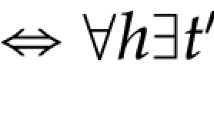Abstract
This article argues that the mood morphemes found on punctual verbs in Mohawk are to be analyzed semantically as markers of verbal definiteness/specificity. In particular, the so-called future marker is an indefinite morpheme, indicating that the event argument of the verb undergoes Heim's (1982) rule of Quantifier Indexing. In contrast, the seeming past marker is a marker of definiteness/specificity, indicating that the event argument is immune to Quantifier Indexing. This explains many apparent peculiarities of the Mohawk verbal system, including: the use of "future" as a past habitual form, the use of mood prefixes in conditionals, free relatives, and complement clauses, and the incompatibility of "past" with negation. The relationship between indefinite mood and future events, where it exists, is explicated in terms of the branching theory of time proposed by Dowty (1979) and Kamp and Reyle (1993), which is grounded in a fundamental asymmetry in how humans conceive of the future versus the past.
Similar content being viewed by others
REFERENCES
Aubasch, D: 1994, ‘The Scope of Indefinites’, Natural Language Semantics 2, 83–137.
Baker, Mark: 1996, The Polysynthesis Parameter, Oxford University Press, New York.
Baker, Mark and Lisa Travis: 1996, ‘Events, States, and Mohawk Verb Inflection’, unpublished ms., McGill University.
Carlson, Greg: 1977, Reference to Kinds in English, Ph.D. dissertation, University of Massachusetts, Amherst.
Chafe, Wallace: 1967, Seneca Morphology and Dictionary, Smithsonian Contributions to Anthropology, vol. 4, Washington, D.C., Smithsonian Press.
Chafe, Wallace: 1970, A Semantically Based Sketch of Onondaga, Waverly Press, Baltimore.
Chamorro, Adriana: 1992, On Free Word Order in Mohawk, M.A. thesis, McGill University.
Chung, Sandra and Alan Timberlake: 1985, ‘Tense, Aspect, and Mood’, in T. Shopen (ed.), Language Typology and Syntactic Description, Cambridge University Press, Cambridge, pp. 202–258.
Comrie, Bernard: 1976, Aspect, Cambridge University Press, Cambridge.
Davidson, Donald: 1967, ‘The Logical Form of Action Sentences’, in N. Rescher (ed.), The Logic of Decision and Action, University of Pittsburgh Press, Pittsburgh, pp. 81–95.
Deering, Nora and Helga Delisle: 1976, Mohawk: A Teaching Grammar, Thunderbird Press, Kahnawake, Quebec.
Diesing, Molly: 1992, Indefinites, MIT Press, Cambridge, Mass.
Dowty, David: 1979, Word Meaning and Montague Grammar, Reidel, Dordrecht.
Emonds, Joseph: 1985, A Unified Theory of Syntactic Categories, Foris, Dordrecht.
Evans, Nicholas: 1991, ‘A Draft Grammar of Mayali’, unpublished ms., University of Melbourne.
Fodor, Jerold and Ivan Sag: 1982, ‘Referential and Quantificational Indefinites’, Linguistics and Philosophy 5, 355–398.
Foster, Michael: 1985, ‘The Language of Tense, Mood, and Aspect in Northern Iroquoian Descriptions’, International Journal of American Linguistics 51, 403–405.
Foster, Michael: 1986, ‘Updating the Terminology of Tense, Mood, and Aspect in Northern Iroquoian Descriptions’, International Journal of American Linguistics 52, 65–72.
Heim, Irene: 1982, The Semantics of Definite and Indefinite Noun Phrases, Ph. D. dissertation, University of Massachusetts, Amherst.
Higginbotham, James: 1985, ‘On Semantics’, Linguistic Inquiry 16(4), 547–594.
Kamp, Hans: 1981, ‘A Theory of Truth and Semantic Representation’, in J. Groenendijk, T. Janssen, and M. Stokhof (eds.) Formal Methods in the Study of Language, Mathematical Centre, Amsterdam, pp. 277–322.
Kamp, Hans and Uwe Reyle: 1983, From Discourse to Logic, Kluwer, Dordrecht.
Kratzer, Angelika: 1989, ‘Stage Level and Individual Level Predicates’, unpublished ms., University of Massachusetts, Amherst.
Lefebvre, Claire: to appear, ‘Multifunctionality and Variation among Grammars: The Case of Determiners in Haitian and in Fongbe’, Journal of Pidgin and Creole Languages.
Lewis, David: 1975, ‘Adverbs of Quantification’, in E. Keenan (ed.), Formal Semantics of Natural Language, Cambridge University Press, Cambridge, pp. 3–15.
Lounsbury, Floyd: 1953, Oneida Verb Morphology, Yale University Press, New Haven.
Ormston, Jennifer: 1993, Some Aspects of Mohawk: The System of Verbal Inflectional Categories, M.A. thesis, McGill University, Montreal, Quebec.
Parsons, Terence: 1990, Events in the Semantics of English: A Study in Subatomic Semantics, MIT Press, Cambridge, Mass.
Partee, Barbara: 1984, ‘Nominal and Temporal Anaphora’, Linguistics and Philosophy 7, 243–286.
Roberts, Craige: 1989, ‘Modal Subordination and Pronominal Anaphora in Discourse’, Linguistics and Philosophy 12, 683–721.
Rothstein, Susan: 1995, ‘Adverbial Quantification over Events’, Natural Language Semantics 3(1), 1–33.
Scott, K. Shirley (ed.), 1991: Old Kahnawake, Kanie'kehaka Raotitiohkwa Press, Kahnawake, Quebec.
Stowell, Timothy: 1982, ‘The Tense of Infinitives’, Linguistic Inquiry 13, 561–570.
Stump, Gregory: 1992, ‘On the Theoretical Status of Position Class Restrictions on Inflectional Affixes’, Yearbook of Morphology 1991, 211–242.
Travis, Lisa deMena: 1994, ‘Event Phrase and a Theory of Functional Categories’, in P. Koskinen (ed.), Toronto Working Papers in Linguistics, Canadian Linguistics Association, pp. 559–570.
Travis, Lisa deMena: forthcoming, Inner Aspect, Kluwer, Dordrecht.
Ultan, Russell: 1978, ‘The Nature of Future Tenses’, in J. Greenberg (ed.), Universals of Human Language, Stanford University Press, Stanford, Cal., pp. 83–123.
Watkins, Laurel J.: 1984, A Grammar of Kiowa, University of Nebraska Press, Lincoln.
Whorf, Benjamin: 1956, Language, Thought and Reality: Selected Writings of Benjamin L. Whorf. John B. Carroll (ed.), MIT Press, Cambridge, Mass.
Williams, Marianne (ed.): 1976, Kanien‘kéha’ Okara'shó n:'a (Mohawk Stories), New York State Museum, Albany.
Author information
Authors and Affiliations
Rights and permissions
About this article
Cite this article
Baker, M., Travis, L. Mood as Verbal Definiteness in a "Tenseless" Language. Natural Language Semantics 5, 213–269 (1997). https://doi.org/10.1023/A:1008262802401
Issue Date:
DOI: https://doi.org/10.1023/A:1008262802401



